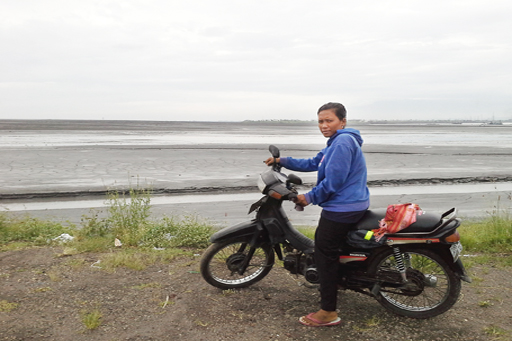The Jakarta Post, Sidoarjo – The embankment of the Lapindo mud retaining pool in Sidoarjo, East Java burst on Wednesday evening because of high rainfall in the area, forcing residents, most of whom have not received compensation, to take shelter.
“The burst embankment will be rebuilt 5 meters high. However, residents often blockaded the project, so the embankment, which is still only 3.5 meters high, collapsed and caused water to engulf residents’ homes and flow into the river,” Sidoarjo Mudflow Mitigation Agency (BPLS) spokesman Dwinanto Prasetyo said on Thursday.
Dwinanto said the government had provided a shelter for affected residents at the Gempolsari village hall, which could accommodate around 100 people, or 20 families, from the village.
“We have set up a kitchen and provided blankets, clothing and other supplies at the shelter. However, residents prefer to remain in their swamped homes,” he said.
He added the BPLS had operated two pumps to channel mud to the main retaining pool, from where two dredges would dump the mud into the Porong River.
One of the residents, Sri Asih, 41, said her family refused to stay at the shelter provided by the local administration, since staying at home was far more comfortable.
“Each heavy rain, we are always wary of the condition of the mud embankment, because it has collapsed before and water mixed with mud engulfed my home and damaged the furniture,” Sri told The Jakarta Post on Thursday.
“We prefer moving our belongings, such as furniture, to the shelter at the village hall. If the water level rise further, we will obviously evacuate to the village hall,” she added.
Sri hoped the government would soon fulfill its promises to pay compensation for her house and land, which were included on the map of areas affected by the Lapindo hot mudflow disaster.
The government earlier announced it would pay compensation of Rp 781.7 billion (US$60.2 million).
Many criticized the government’s decision over the compensation as it is actually the responsibility of PT Lapindo Brantas, a company controlled by the family of Aburuzal Bakrie, who is also chairman of the Golkar Party.
PT Lapindo partly owns PT Minarak Lapindo Jaya (MLJ), which conducted gas exploration activities in the affected area leading to a blowout at one of Lapindo’s natural gas wells in 2006.
Lapindo has persistently denied its exploration activity was the cause of the mud flow, instead blaming an earthquake in Yogyakarta, hundreds of kilometers to the west.
Another victim, Ahmadi, 54, expressed hope President Joko “Jokowi” Widodo would not break his promise to immediately resolve the issue.
“We are actually tired of the promises. If the government is still concerned with the fate of the hot mudflow victims, the payment process should not have been complicated,” said Ahmadi.
Commenting on the planned compensation, Dwinanto Prasetyo said that although the government had provided the bailout funds, it must still wait for the completion of auditing by the Development Finance Comptroller (BPKP) before they could be disbursed.
Meanwhile, East Java Governor Soekarwo said the disbursement of the funds for mudflow victims should go through several stages.
Indra Harsaputra
Sumber: http://www.thejakartapost.com/news/2015/03/20/lapindo-mud-wall-falls-residents-sorrows-spiral.html




